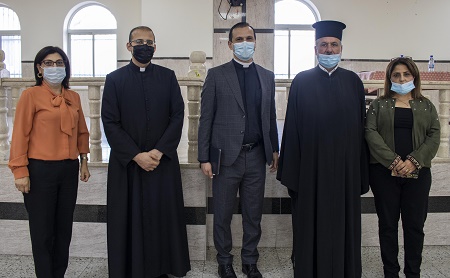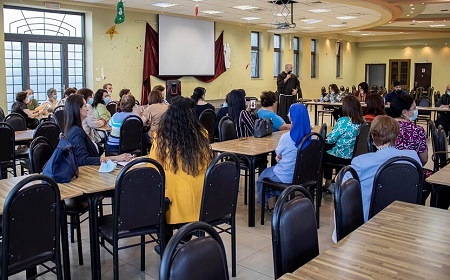|
MIFTAH caps off a series of meetings to raise awareness about the gender gaps in policies and regulations in ecclesiastical courts
Bethlehem – 19/10/2020 – MIFTAH recently capped off a series of meetings to raise awareness about adopting laws in ecclesiastical courts to coincide with human rights treaties signed by Palestine. Prior to the meetings, a public policy paper was released by MIFTAH, which addresses the gender gaps in policies and regulations in effect in ecclesiastical courts. The meetings included a presentation on and discussions about the clarifications and recommendations from the policy paper, which addressed the gaps in church polices that constitute challenges for women and youth in accessing justice. It also discussed the working mechanisms and reforms necessary for ensuring the protection of women’s and youth’s rights. The participants discussed the importance of abiding by international human rights and treaties, demonstrating articles in international treaties that coincide with Palestinian national treaties and conventions including the Declaration of Independence and the Basic Law, as affirmation of the principles of equality and non-discrimination. These include CEDAW (The Convention on the Elimination of all Forms of Discrimination Against Women), of which Palestine is a signatory, along with others. The meetings were attended by several society sectors, including Christian clergy (both men and women) from courts in the Bethlehem district. The meetings are part of MIFTAH’s OXFAM-supported “Conflict and Fragility” project. Presentation During the meetings, MIFTAH’s policy paper was presented by Judge Scarlett Bishara from the Lutheran Church’s Court of First Instance. She spoke about the challenges Christian women face when they turn to ecclesiastical courts, most prominently the challenges pertaining to legal measures and policies in effect in some of these courts and which contradict with the values of equality and relevant references in the Bible. This is besides the challenges and difficulties women face regarding alimony and child custody. Bishara’s presentation concluded by saying that church laws are founded on the concept and philosophy that women need guardianship in the form of a man to oversee her affairs. Men are considered the custodians over women in regards to inheritance and family-related issues. During the meetings, a presentation was given on CEDAW by researcher Salwa Abu Hashish in addition to a presentation by attorney, Ala’ Ghanayim on human rights and international agreements and the importance of abiding by and working in accordance with them. Interventions Several clerics from the various Christian denominations gave interventions during the meetings on the status of women in a patriarchal society, confirming their opposition as clergy to violence against women. They spoke about domestic problems in communities and the injustice and oppression women suffer on issues pertaining to the personal status law, reiterating their rejection of any mistreatment that negatively reflects on family relations and on the cohesiveness of the Palestinian social fabric. The speakers expressed their full willingness to offer any necessary moral and material support, including help with resolving domestic problems inside churches and working with both Christian and Muslim women. The participants also reaffirmed the major role of both men and women in building the family community, pointing to a number of steps churches have made towards their parishes. They also pointed out texts in the Bible that reaffirm the concept of equality between men and women, maintaining that churches in Palestine have contributed to the education of women and education in Christian schools in general in line with the principle of equality espoused in the Bible. They said this education is based on the standpoint of equality of all of creation and on dignity, responsibility and redemption in a bid to curtail the extremism and violence women and youths may endure.
 Recommendations: A number of recommendations were concluded from the meetings, including: the need to continue holding awareness meetings on international and regional conventions and further expand awareness on ecclesiastical laws and the family protection law; holding sessions and workshops for raising the awareness of both men and women on change; holding meetings with decision-makers regarding accountability and utilizing interpretations in the Bible from a women’s perspective. In this context, the women participants called on MIFTAH to help in presenting the laws of each church to compare them with each other and therefore be able to demand the required changes; they called for organizing awareness campaigns for school and university students as change-makers and for the need to form a committee of the four churches in Bethlehem, Beit Sahour and Beit Jala to work as one campaign team; the participants also called for creating leaders within the churches who are capable of change. Meanwhile, MIFTAH coordinator in Bethlehem Yolla Khair maintained that the women and youth sectors were very welcoming of the meetings in the three cities. She also noted the significance of the clergies’ contributions in highlighting the perspective of rights in the Bible, along with interventions from rights activists in raising awareness over human rights treaties, which contributed to expanding the circle of dialogue and consultations between clerics, rights activists and local communities. Khair also said there was consensus over the need to combine efforts towards promoting the principles of equality, non-discrimination and the renunciation of violence in Palestinain society at large.

http://www.miftah.org |